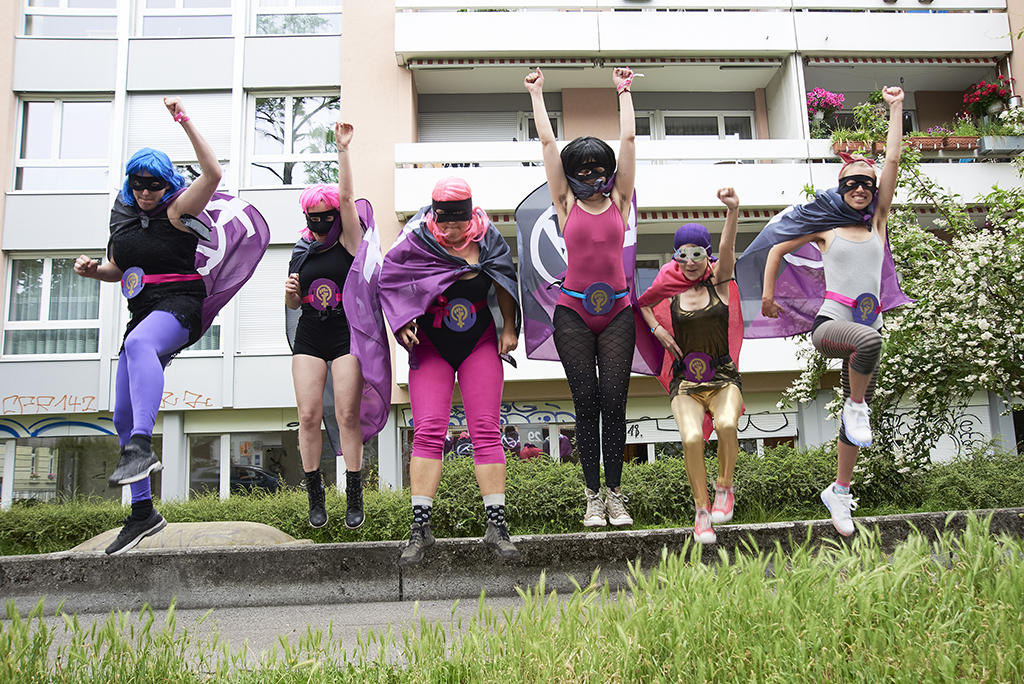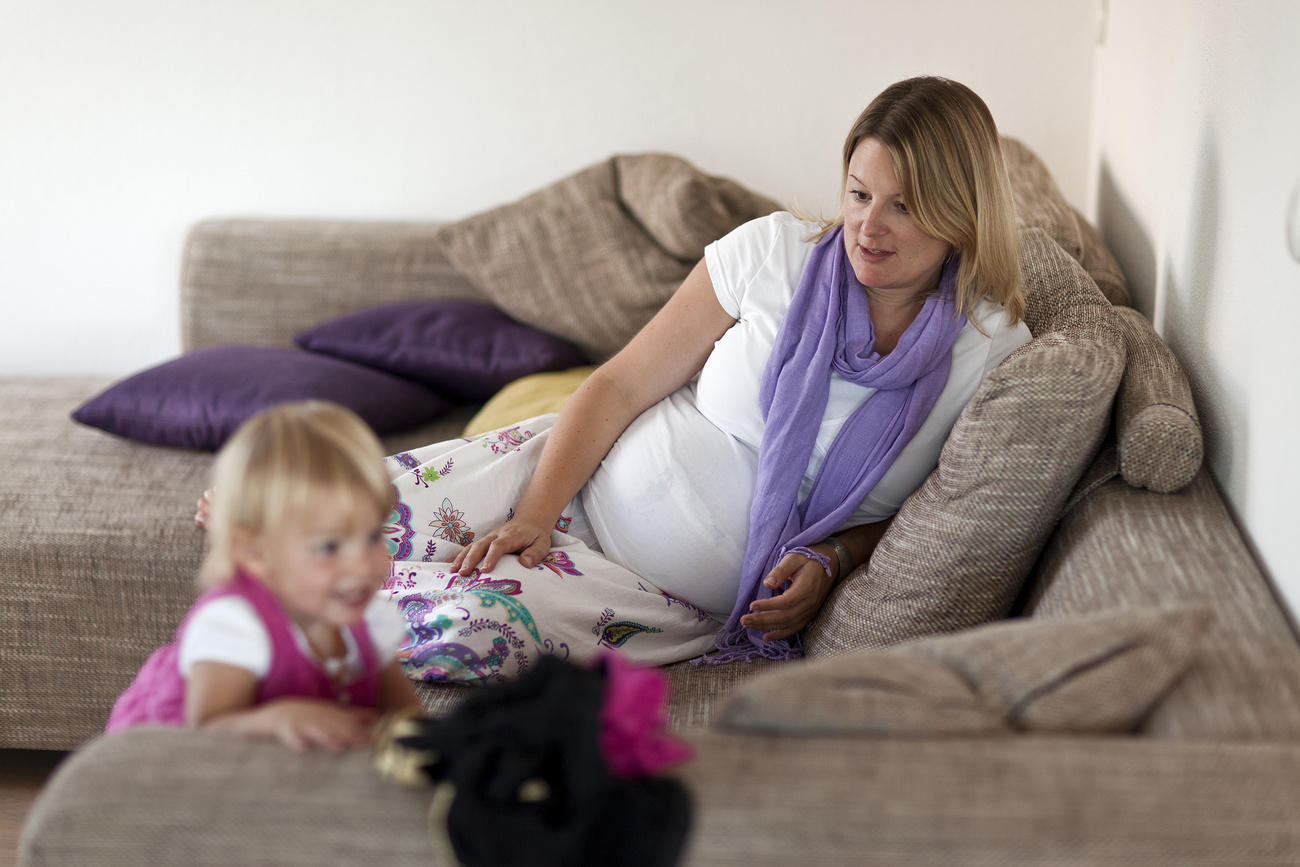Why Switzerland doesn’t have paternity leave

Swiss citizens will vote on September 27 on whether to introduce two weeks' paternity leave, decades after other western countries resolved the issue. Sociologist Isabel Valarino explains why Switzerland has dragged its feet on this.
Switzerland differs from other western countries in not having parental leave and paternity leave. In Europe, all countries have introduced one or the other, if not both. Sweden, one of the pioneering states, brought in paid parental leave in 1974.
And since 1996, the European Union (EU) has issued directives External linkthat are increasingly binding in this area; from 2022, EU member states must introduce a minimum 10 days paid paternity leave and four months paid parental leave for each parent, of which two months are non-transferable.
Isabel Valarino, a sociologist with canton Geneva’s research and education service, is an expert on the issues of parental and paternity leave. She gives us her insight.
swissinfo.ch: Why is Switzerland one of the only western countries not to have paternity leave?
Isabel Valarino: Switzerland’s lateness in providing parental and paternity leave is linked to its delay in introducing maternity insurance. After the principle was adopted in the Constitution, it took 50 years before a law was enacted in 2005. The absolute priority was therefore to introduce maternity leave before moving to include fathers. There had been proposals for parental leave, but they were dismissed and given their failure the debate focused on a minimal maternity insurance scheme that would gather a consensus.
The late entry of women into politics has also played a role, as has semi-direct democracy and the federal state. Several issues are moving very slowly in Switzerland because you need a very solid consensus for a new law to be adopted. Numerous propositions for paternity leave and parental leave have been submitted to Parliament, but each time they have been rejected.
For a long time, forces on the political right and centre-right considered that granting paternity leave through collective bargaining — that is, negotiated between unions and employers — was enough. Switzerland also has a culture of individual responsibility, and therefore a reluctance in principle to extend the welfare state.

Does Switzerland still have a traditional view of the family?
Yes, that is still very entrenched, even if there are more egalitarian ideas as well. Women doing paid work is no longer in question, but they still must be able to look after the children and the family. This is why part-time work is so important in Switzerland. Once the first child is born, the most frequent pattern in Switzerland is for the man to work full-time and the woman part-time.
The division of roles in the home continues to be gendered and the absence of paternity leave contributes to that. The current State policy does not consider fathers to be legitimate caregivers, but they also don’t have the same opportunity as mothers to invest in that role.
So it’s as if paternity were not recognised by the State?
Yes, absolutely. It’s considered optional and the role is quite vague. The State deems it’s an individual choice and the father still has the option to take vacation days.
Social policies have an impact on people’s views and on social norms, they implicitly say what is considered a “just” society and a “normal” family. If there is no provision for the father, the State endorses that it is an individual choice to be present at the birth or not. It does not take into account that not everyone has the same financial possibilities or the same leverage with their employer to take, for example, non-paid paternity leave. It leaves the responsibility to the employee to negotiate at his level, knowing that this leave is still undervalued in our society and sometimes difficult to get the employer to accept.

More
Are ten days of paternity leave too much or not enough?
You studied fathers working for the City of Lausanne who were able to take paternity leave. What did you observe?
The fathers took their leave in a variety of ways, sometimes in a bloc at the time of the birth, sometimes one or two days a week. I noticed that they often took account of their workload and their employer’s opinion. When a measure is not part of the strict legal framework, there is more of this idea of being accountable, of being one of the lucky ones. The employees didn’t really know if it was a right or whether, like holidays, leave needed to be validated by the employer.
For most of the couples I met, their division of labour over the longer term was gendered, with the women reducing their working time to look after the children. I realised that the fathers who decided to use their paternity leave not in a bloc but to work part-time found themselves more often alone with the child and their caring role became more important, more autonomous. These few fathers then decided to move to part-time work over the longer term and a more equal model of professional activity within their couple.
So two weeks of paternity leave right after the birth is not enough?
It’s really the bottom threshold at which there can be an effect on fathers’ implication in household tasks. The effects are greater with longer periods of leave and time taken when the mother goes back to work.
Parental leave and paternity leave are complementary, in my opinion. After the birth, the issues are mainly supporting the mother, domestic tasks, growing into this new role of father. For equality between the genders, the determining factor is the length of leave and whether the father finds himself alone with the child. A lot of countries have the model of paternity leave at the birth, then after maternity leave parental leave during which each parent has the right to a certain number of days.
So should part of the parental leave be solely for the father?
Yes. Research shows that if the leave is parental but transferable, most people go for a more traditional model with the mother taking long leave and the father almost nothing. There are several reasons for this: if the leave is optional, the father may fear he’ll be perceived as less motivated at work. For fathers to take the leave, it must be an individual right, non-transferable and well paid. Given that the men usually work full-time and have the better salary, couples are going to make a financial calculation when it comes to sharing parental leave and usually the mother will take it.
Do you think that the absence of paid paternity leave in Switzerland is holding back greater equality between men and women, whether at the professional level or in domestic work?
Paternity leave can contribute to more equality, but alone it cannot solve everything. It must be part of an integrated and harmonious family policy, in a society that accepts and values the contribution of men and women — both in the family and professional environment. This vote on two weeks’ paternity leave could help change things by making it a legal right.
But it’s a long-term issue and we also need other steps such as more places in childcare. The arrival of the first child is often the key time when inequality is created in the couple. If there are more measures allowing the father to be present and share childcare, he can build a different relationship with the child, and this can lead to more equality in the family over the long term.
Translated from French by Sophie Douez
Translated from French by Sophie Douez

In compliance with the JTI standards
More: SWI swissinfo.ch certified by the Journalism Trust Initiative













Join the conversation!